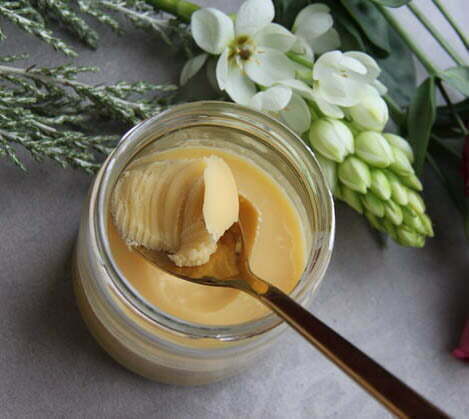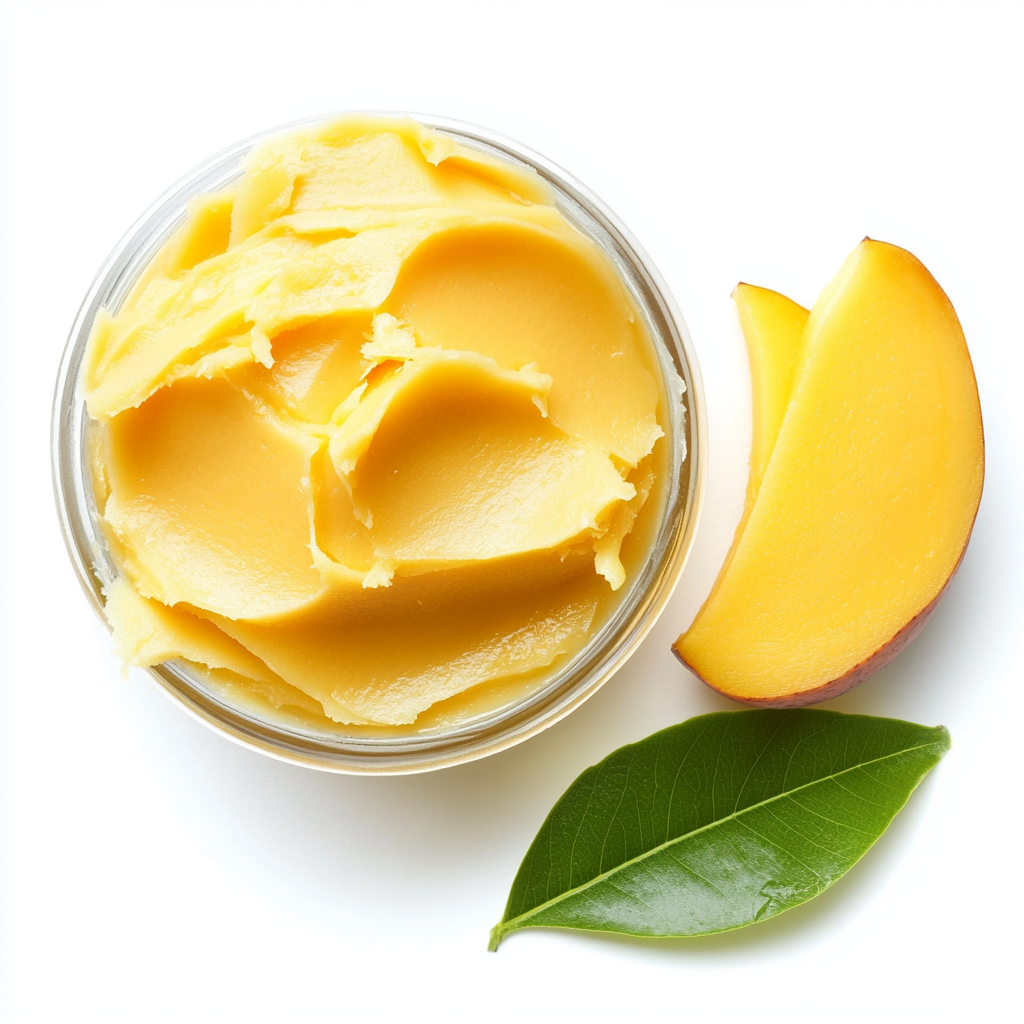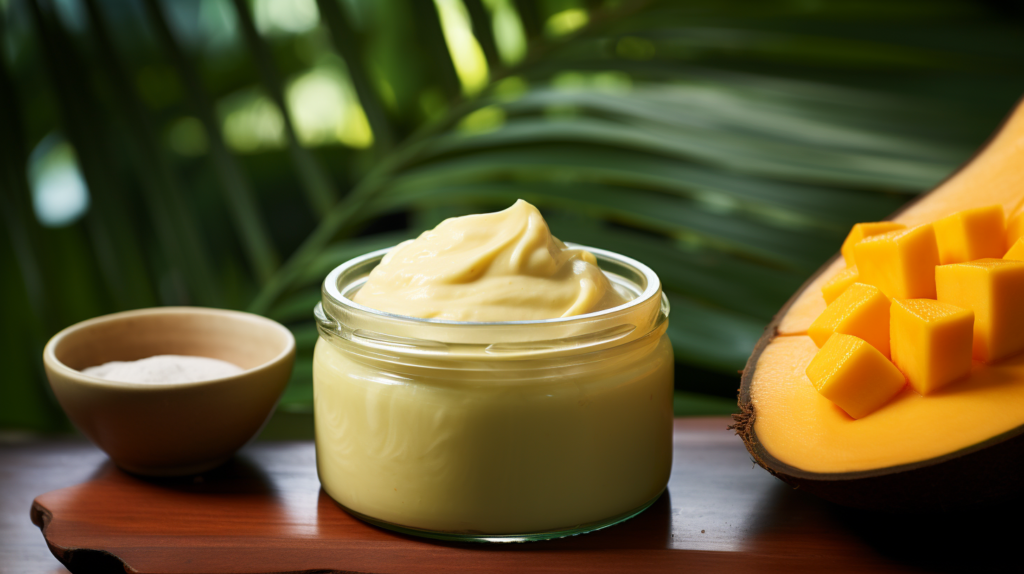Recently updated on: December 29th, 2023
In Africa’s lush landscapes, a hidden gem in natural beauty is making waves: Mango Butter. This butter, crafted from mango kernels, is gaining fame in natural skincare and haircare. It’s not just a regular moisturizer. Mango butter is a treasure trove of nutrients, offering benefits for both skin and hair. Unlike well-known cocoa and shea butter, it brings a unique blend of nourishing elements to the table.
Mango butter Mango butter is packed with essential fatty acids, antioxidants, and vitamins. These elements make it more than just a hydrating agent; it’s a nutrient-rich powerhouse. Its ability to hydrate and soften is why it’s becoming popular in beauty products. But there’s more to it than just skin and hair benefits. Mango butter also tells a story of ethical sourcing and support for African communities. This piece aims to delve into the many aspects of mango butter. We’ll compare it with cocoa and shea kinds of butter and understand its place in natural beauty. The goal is to offer a clear, straightforward understanding of mango butter’s role and benefits.
Mango Butter: A Deep Dive into Its Composition
Mango butter stands out as a unique, multi-purpose natural ingredient for skin and hair wellness. It’s packed with essential fatty acids like oleic and stearic acids, known for their superior moisturizing qualities. These acids are vital to keeping skin supple and well-hydrated. Moreover, mango butter is rich in vitamins A, C, and E, which are potent antioxidants. These vitamins are not just nourishing; they also shield skin and hair from everyday environmental hazards like pollution and UV rays.
What sets mango butter apart from other natural kinds of butter is its texture. Unlike others, it’s not greasy, making it perfect for all skin types, even oily and combination skin. It’s light enough to penetrate skin and hair deeply, providing essential nutrients without leaving behind any heavy, uncomfortable residue. This feature is especially beneficial for those who want adequate hydration minus the greasiness typical of natural kinds of butter.
In summary, mango butter is a versatile, profoundly nourishing choice for a variety of skin and hair care needs. It offers hydration, protection, and essential nutrients, all while being suitable for different skin types due to its non-greasy, lightweight nature.

Cosmetic butters
The cosmetic butters in our offer are a true treasure trove of natural skin care. Among the available raw materials, you will find a wide selection of high-quality vegetable butters, which are essential for creating rich, nourishing cosmetic formulas.
All our cosmetic butters are sustainably sourced and produced according to the highest quality standards. They are completely natural, contain no chemical additives, and are safe for the skin.
Skin Benefits
For the skin, mango butter is nothing short of a miracle. It’s an emollient, which means it can soften and soothe the skin. Its moisturizing properties are not merely surface-level; mango butter penetrates deeply, bringing hydration to even the driest of skins. It’s particularly beneficial for those battling with dry skin, eczema, or dermatitis. Additionally, its antioxidant properties aid in fighting against environmental stressors, a boon in today’s pollution-laden world.
Hair Benefits
When it comes to hair, mango butter reveals its versatility. It’s a natural conditioner, able to bring life back to dry and damaged hair. Its nutrients help strengthen hair, promote growth, and add a healthy shine. Those with curly or coarse hair might find it incredibly beneficial, as it helps in managing frizz and adding definition.
Comparison with Cocoa and Shea Butter
While mango butter shares similarities with cocoa and shea butter, particular distinctions set it apart. Cocoa butter, known for its rich and chocolaty aroma, is denser and might be more suited for dehydrated skin. Shea butter, on the other hand, is renowned for its healing properties. However, mango butter boasts a lighter texture, making it ideal for those who prefer a non-greasy feel. Its composition also makes it a more versatile choice, suitable for a broader range of skin types and hair textures.
Sustainability and Ethical Considerations
As we embrace natural products like mango butter, it’s crucial to consider sustainability and ethical sourcing. Mango butter, when sourced responsibly, can provide a sustainable livelihood for African communities. It’s vital to support fair trade practices, ensuring that those at the grassroots level are fairly compensated for their labor and resources.

Mango butter
The butter is made by cold-pressing seeds of Mangifera indica, commonly known as mango. Thanks to that, mango butter retains all its properties.
- moisturizes and regenerates the skin,
- protects against UV rays,
- slows down the signs of aging skin.
In Conclusion
Mango butter is more than a moisturizer; it’s a testament to nature’s generosity. It offers a lightweight alternative to traditional moisturizers, supports sustainable agriculture in Africa, and suits
a wide range of skin and hair types. Its rise in popularity is a narrative of natural beauty, environmental consciousness, and economic upliftment.
In sum, mango butter stands as a symbol of Africa’s rich natural heritage, offering a unique, sustainable, and effective solution for skincare and haircare. Its properties, distinct from cocoa and shea butter, make it an invaluable addition to the natural beauty regimen, fostering both individual well-being and community growth.
References
Raw Mango Butter Blend – Medium. (n.d.). Africa Imports. Retrieved December 1, 2023, from https://africaimports.com/raw-mango-butter-16-oz#:~:text=Mango%20butter%20has%20natural%20emollient
www.africanfairtradesociety.com. (2023). Organic Shea Butter Vs. Mango Butter – Which One Is Better? African Fair Trade Society. https://www.africanfairtradesociety.com/blogs/blog/organic-shea-butter-vs-mango-butter-which-one-is-better
mykaoshop.com. (2021). Cocoa Butter vs. Shea Butter. Jergens. https://mykaoshop.com/blogs/jergens/cocoa-butter-vs-shea-butter#:~:text=Both%20shea%20butter%20and%20cocoa


